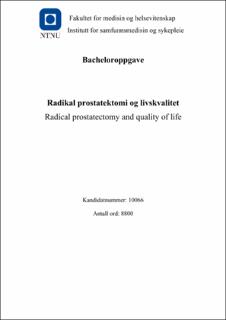Radikal prostatektomi og livskvalitet
Abstract
Tittel: Radikal prostatektomi og livskvalitetHensikt: Hensikten med denne studien er å undersøke hvordan sykepleier gjennom undervisning og veiledning kan bidra til å øke livskvaliteten til pasienter som behandles med radikal prostatektomi.Problemstilling: Hvordan kan man som sykepleier bidra til økt livskvalitet hos pasienter med prostatakreft som behandles med radikal prostatektomi?Metode: Oppgaven bygger på en litteraturstudie med utgangspunkt i strukturerte og systematiske søk etter vitenskapelige forskningsartikler i forskjellige databaser. Det er anvendt relevant pensumlitteratur fra bachelorutdanningen og annen relevant faglitteratur og en fagartikkel. Resultat: Pasientene er ikke forberedt på de fysiske og psykiske konsekvensene ved behandlingen, selv om de vet at dette kan påvirke livskvaliteten. I flere tilfeller opplever mennene at de ikke har fått informasjon, eller at de ikke husker at de har fått informasjon. Mange opplever å ikke få snakket om problemene sine med helsepersonell. For par som får snakket om problemene sine kan det påvirke forholdet positivt. Å fortelle og dele historien sin kan bidra til mestring. Konklusjon: En god relasjon mellom sykepleieren og pasienten er et godt utgangspunkt for veiledning. Informasjon bør tilpasses den enkelte, og pasienten bør få opplæring i mestringsstrategier og forebyggende øvelser. Sykepleieren bør ta opp vanskelige tema med pasienten. Å inkludere pårørende når man informerer pasienten slik at pårørende kan være til støtte for pasienten. Likemennsordninger kan være til god hjelp, og sykepleieren bør oppfordre til å benytte seg av slike ordninger.Nøkkelord: Radikal prostatektomi, prostatektomi, prostatakreft, livskvalitet, sykepleie, informasjon, pasientundervisning. Title: Radical prostatectomy and quality of lifeAim: The aim of this study is to examine how nurses can educate and guide patients undergoing radical prostatectomy, in order to contribute to patients achieving an increased quality of life. Research question: How can nurses contribute to an increased quality of life in patients with prostate cancer being treated with radical prostatectomy?Method: The thesis is based on a literature study based on structured and systematic searches for scientific research articles in different databases. Relevant syllabus literature from the Bachelor´s degree program and other relevant academic literature and one academic article has been used. Results: Patients are not prepared for the physical and psychological consequences of treatment, even though they know this can affect the quality of life. In many cases, men feel that they have not received information or that they do not remember to have received information. Many people experience not being able to talk about their problems with health professionals. For couples who talk about their problems, it can affect their relationship positively. Telling and sharing their story can help the men adapt to their situation. Conclusion: A good relation between the nurse and the patient is a good starting point for guidance. Information should be tailored to the individual and the patient should be trained in coping strategies and preventive exercises. The nurse should address difficult issues with the patient. By including patients’ relatives when informing the patient, the relatives can be a support for the patient. Peer support groups can be helpful, and the nurse should encourage the men to seek out such groups.Key words: Radical prostatectomy, prostatectomy, prostatic cancer, prostatic neoplasms, quality of life, nursing, information, patient education.
